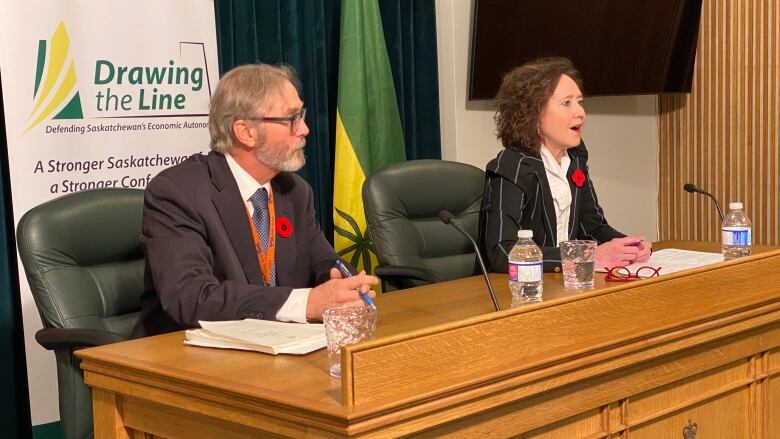Saskatchewan First Act introduced, meant to 'confirm' provincial jurisdiction over natural resources
'This isn't fed-bashing for kicks,' says Sask. justice minister

On Tuesday, the Saskatchewan government introduced the Saskatchewan First Act, which it says will confirm the province's autonomy and jurisdiction over its natural resources.
Last week, the provincial government said the act would be its first move of the fall sitting.
"This isn't about fed-bashing for kicks. This is about quantifying, assessingand defining economic harm. It's about our place in this federation and our responsibility to the people of Saskatchewan to foster economic growth," said Saskatchewan Minister of Justice Bronwyn Eyre on Tuesday.
The act "asserts its exclusive legislative jurisdiction under the Constitution of Canada, and in particular, those matters listed in sections 92 and 92A of the Constitution Act,1867."
The act says Saskatchewan has jurisdiction over the following:
- Exploration of non-renewable resources.
- Development, conservationand management of non-renewable natural and forestry resources.
- Operation of sites and facilities for generation and production of electricity.
- Regulation of all industries and businesses falling within provincial jurisdiction.
- Regulation of fertilizer use.
The act says that in each of the above, the province holds jurisdiction over regulation of environmental standards, greenhouse gas and other emissions.
The second part of the Saskatchewan First Act would amend the Saskatchewan Act to include:
- Saskatchewan has autonomy with matters falling under its exclusive legislative jurisdiction, pursuant to the Constitution Act,1867.
- Saskatchewan depends on agriculture, development ofnon-renewable resources, forestry, and electrical energy generationand production.
- Production of the above is "critical to the well-being and prosperity ofSaskatchewan and its people."
The new act says those sections will also be added to the Constitution Act,1867.
It also creates an economic impact assessment tribunal that will study the economic impacts of federal policies.
Eyre said the tribunal will be independent and called upon when needed.
Government lawyer says amendments do not disregard federal laws
Mitch McAdam, director of the province's constitutional law branch, said he thinks the amendments introduced will help the province argue cases of jurisdiction with the federal government in court if it comes to that.
"There is nothing in the amendments that say the province can disregard federal laws or that federal laws will no longer apply in Saskatchewan. What the law does is it recognizes that is the role of the courts, and the courts are the ultimate arbiters of where that dividing line is between federal and provincial jurisdiction," McAdam said.
McAdam was part of the government's team that argued the federal carbon tax was unconstitutional at the Supreme Court. The court sided with the federal government in a 6-3 decision.
Eyre said the new amendments "send a signal" to the courts on where Saskatchewan believes it has jurisdiction and why.
She said the act is not a pretence for a fight in court with the federal government and that the province is looking for a "fair deal" and a "fair partner" in Ottawa.
McAdam said the economic impact tribunal will provide information to "inform future decisions whether that's reference case to the Court of Appeal, seeking an injunction or something else. It will give us those tools that we need to take that case forward to the courts."
Eyre said federal policies are having and will have a negative economic impact on the province.
She mentioned the federal carbon pricing plan, Bill C-69, and the Clean Electricity Standard, which aims to have 100 net-zero emitting electrical generation by 2035. Eyre said the standard would signal an end to fossil fuel electrical generation sources.
She said she hopes the program "will not be a reality."
"We don't have enough hydro to see us through that. We don't have enough ability to transition that quickly. We are trying and those efforts are well documented."
Opposition calls on province to bring back equalization lawsuit
Opposition justice critic Nicole Sarauer said her caucus will look to constitutional law experts and business leaders before deciding whether or not to support the new legislation.
"At first glance, it looks like a re-iteration of what already exists," Sarauer said.
She said if the provincial government wants to receivewhat the province "deserves," it should pursue theequalization lawsuit launched by the NDP but dropped by the Saskatchewan Party government in 2008.
"I don't think [the act] has a lot of legal significance. If they really want to further the interests of Saskatchewan people they could further the equalization lawsuit," Sarauer said.












_(720p).jpg)


 OFFICIAL HD MUSIC VIDEO.jpg)
.jpg)



























































































